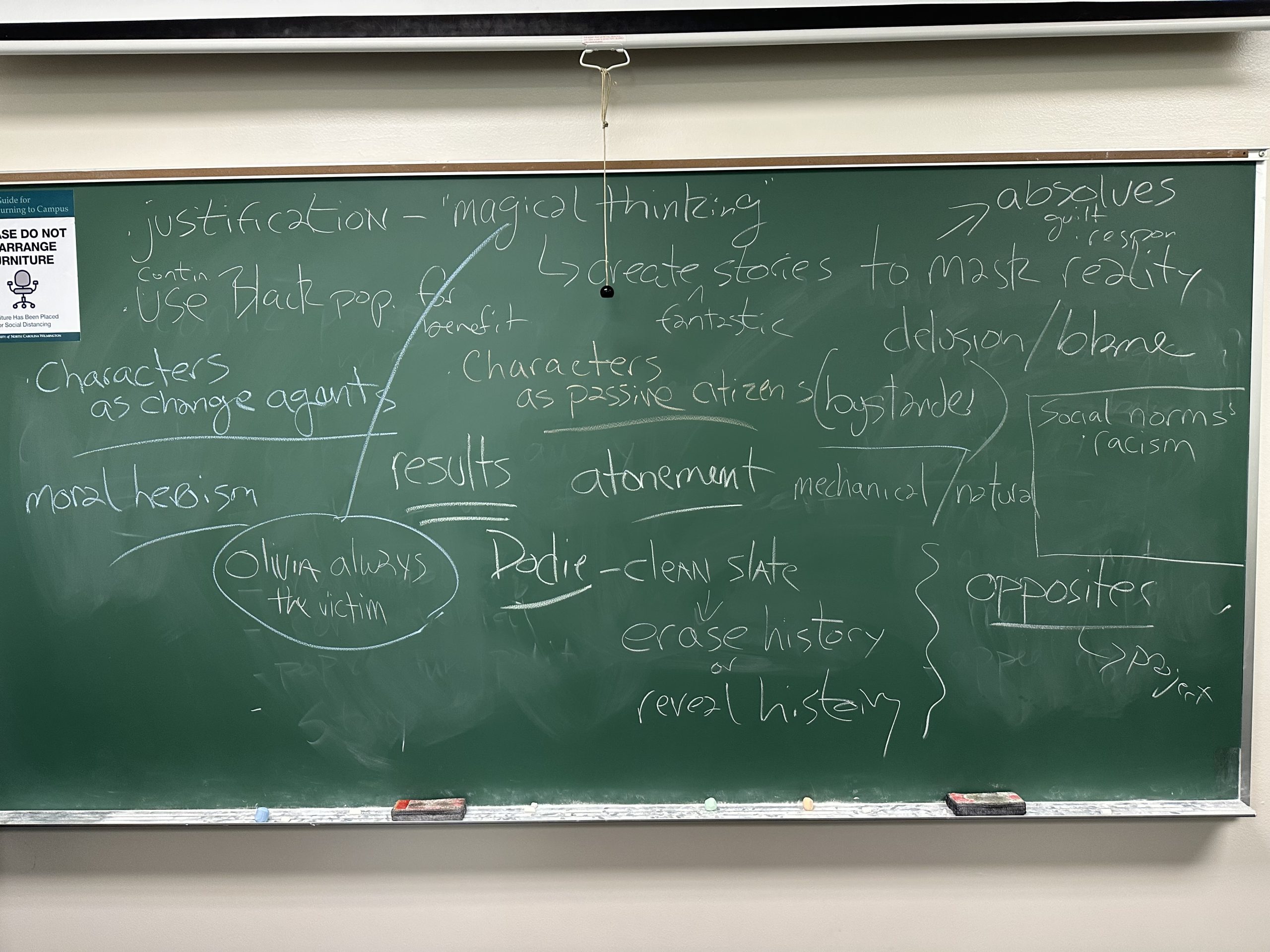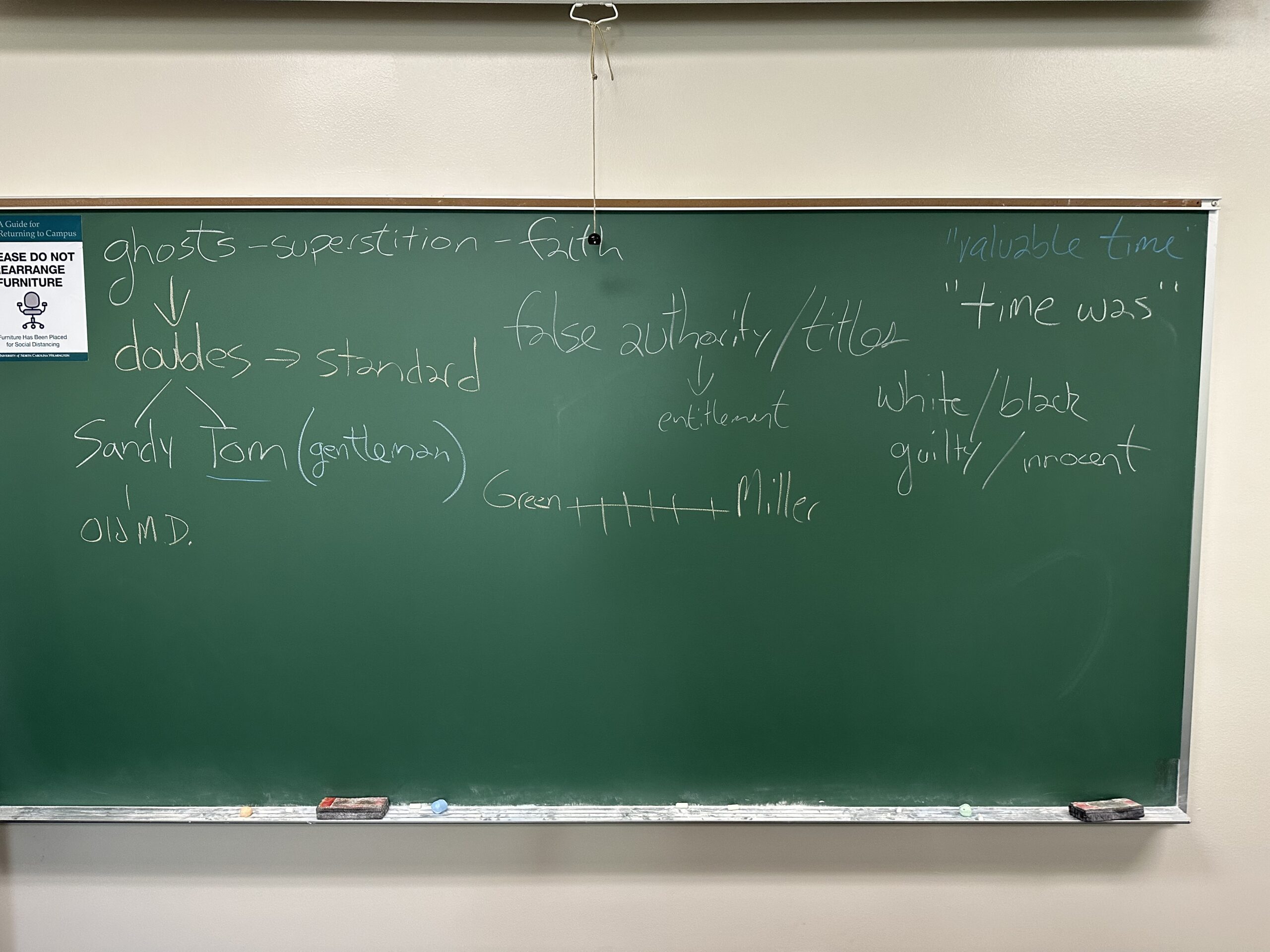Each week students respond to a Discussion Board prompt on Canvas. Their mini essays serve as the springboard for the week’s conversations.
These Discussion Board prompts and the writing and conversations that follow allow students to understand the complexity of The Marrow of Tradition. We try to move beyond labeling the behavior of the characters as “good” or “evil” and instead use our tools of literary analysis to forge a deeper understanding of their actions. Moreover, we avoid the temptation during the first five weeks to draw connections between the novel and the actual events in Wilmington in 1898. This avoidance allows us to ask the question: What does fiction do? Why do we need a novelization of the event?
Here are several of those literary analysis prompts:

Discussion Board: Characters and Themes
This week you are reading the first 50 pages of The Marrow of Tradition. There are a large number of primary and secondary characters in the novel. For your Discussion Post, I would like you to log the primary characters with brief annotations of each that denote their occupation and their familial relation (if any) to other characters in the novel.
The second part of your post should identify and briefly explain three themes that you see in the novel. For insight regarding literary themes, please refer back to our reading from last week; theme is number 10 on the list.
Discussion Board: Complicated Themes
This week your reading will take you to the halfway point of Chesnutt’s novel. You’re seeing the various plots become more and more intertwined, and many of the themes that you identified last week become both more pronounced and more complicated. For this week’s discussion post, I would like you to do a deeper dive into one of three themes:
- Complicated racial views of the Black characters
- Complex ways that masculinity and gentlemanly(ness) are portrayed
- The roles women play in the novel
Discussion Board: Symbolism
As we conclude the fourth week of the semester, you should have read through Chapter 24. For your discussion post, I’d like you to consider the symbolic role of time in the novel. As you’ll remember from “Analyzing and Interpreting Stories,” symbols are components of the story that represent something other than their literal meaning. These elements can be concrete or abstract. For example, the newspapers in the novel are concrete objects that one could argue represent knowledge or wisdom. For this assignment, however, I’d like you to focus on an abstract topic: time.
Two different characters make significant statements about time in this portion of the novel:

Mr. Watson (Black lawyer in Wellington): “Yes that’s the worst of lynch law, but we are wasting valuable time, – it’s hardly worth while for us to discuss a subject we are all agreed upon” (161).
Old Mr. Delamere (White patriarch in Wellington): “But we are wasting valuable time, Sandy, in these old reminiscences. Let us get back to the present” (171).
We can, of course, understand what these utterances mean in their literal context, but I’d like you to think – and to write – about how you may interpret these passages – and this idea – to mean something else than a literal construction. Use concrete evidence from throughout our reading to support your claim. What’s the significance that both a black character and a white character issue these imperatives?
Discussion Board: Quote Analysis
For your next discussion post, choose one of the two quotes listed below and write a short analysis that makes a claim regarding the quote’s larger significance in the novel. How does your chosen quote represent or symbolize or encapsulate a larger theme or idea or motif in The Marrow of Tradition? Please keep your analysis confined to Chapters 25–30.

“A strong man would have long since acknowledged her before the world and taken the consequences; but, alas! I am only myself and the atmosphere I live in does not encourage moral heroism.” —Mr. Merkell, in letter to Mr. Delamere (p. 205)
“If [slavery] had been such a crime, as for a moment she dimly perceived it might have been, then through the long centuries there had piled up a catalogue of wrong and outrage which, if the law of compensation be a law of nature, must some time, somewhere, in some way, be atoned for.” —Olivia Carteret, reflecting on slavery’s legacy and her father’s marriage (p.208)
Remember to make a claim about the quote. Do not merely summarize its context. What do you want to say about it? Bring in other textual evidence to support your claim. Why does your claim and your evidence matter? What is at stake?